Looking for Squarespace alternatives that will better serve your needs?
Maybe you’re eager to start a blog and make some extra income. Or maybe you’ve got a wild idea for an online store or membership site.
In any event, you’re going to need a kick-ass website!
That’s why we’ve selected our top ten Squarespace alternatives and will give you the low down on each so you can make an informed decision on which fits best for you.
Why Look For Squarespace Alternatives?
Why do some people hate Squarespace?
Notably, they:
- Don’t offer backup and restore options
- Lack a third-party app marketplace
- And don’t offer a free Squarespace plan
Not only that, but other site builders offer pre-built templates, responsive website themes, and blogging and eCommerce features similar to (or better than) those you get with a Squarespace account.
That said, let’s explore some alternatives to Squarespace and see if there’s an option that vibes with you.
Top 10 Squarespace Alternatives
So, who are Squarespace’s competitors?
They have plenty, in fact! But we’ve selected the ten that rival Squarespace in terms of features, and also deliver where Squarespace falls short.
We’ve got something for everyone, whether you’re an A-level blogger, an eCommerce pro, a tech guru, or a total newbie.
Let’s giddy up.
1. WordPress.org
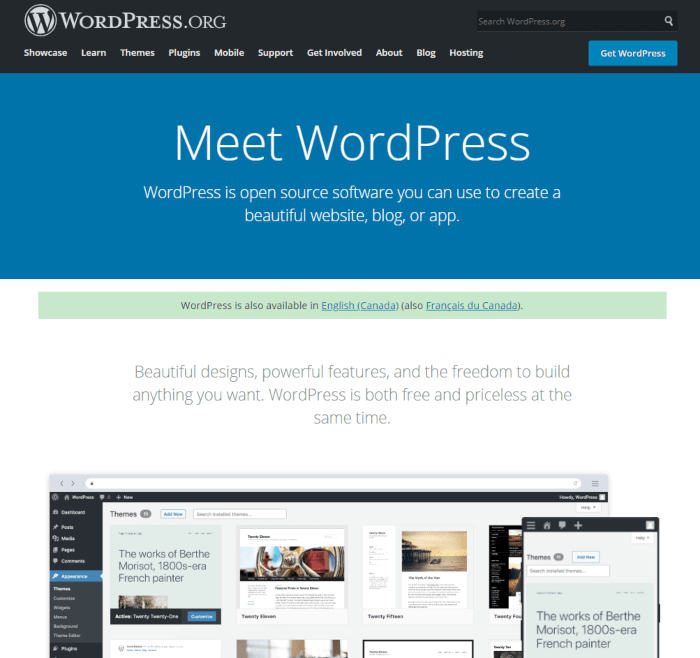
It makes sense to start with WordPress as this platform powers a whopping 43% of websites across the globe!
While a WordPress website is a clear frontrunner for bloggers and online magazines, it is capable of handling any type of website.
It offers standard features, like a block editor system, a commenting system, and strong SEO features.
Keep in mind, WordPress is a Content Management System that requires a WordPress host.
Related: Want to know more about WordPress hosting? Check out these info-packed posts:
Price
WordPress is free, but you pay extra for WordPress hosting and might shell out more money for themes and plug-ins, depending on your preferences.
Pros
- Unrivalled 3,000+ themes for blogging and 55,000+ plug-ins
- Significant market share and popularity means it integrates with everything
- Total control and flexibility; users can install a website theme or plug-in, edit course code and use drag-and-drop editors to get a customized site
- The website builder is free and allows the use of your custom domain
Cons
- Pricing is usage-based outside of the builder, meaning additional web host and other costs
- Hosting management requires technical capability
- Doesn’t include backups and maintenance tasks, which you’ll have to do manually
2. Shopify

Shopify is the clear leader if you have an online store. While most builders offer eCommerce functionality, none can touch Shopify’s next-level inventory, payment gateway, and other systems.
Shopify comes loaded with similar standard features to Squarespace, but Shopify’s interface, integrations, and marketplace (among many other features) are better at addressing eCommerce needs.
Price
Shopify offers three pricing tiers:
- Basic ($29USD/month)
- Shopify ($79USD/month)
- Advanced Shopify ($299USD/month)
Pros
- Includes critical eCommerce integrations with online marketplaces, like Amazon and eBay, as well as analytics tools, like Google Analytics
- Third-party app marketplace to integrate functions like accounting and abandoned cart follow-up
- Excellent templates with an easy-to-use dashboard
- The best option if you want to build and sell a site, as buyers will appreciate an eCommerce platform that they recognize
Cons
- Doesn’t offer a free plan, although you can try Shopify free for 14 days without giving your credit card details
- Lacks the simplicity and ease of use of Squarespace
- Lacks strong blogging functionality
3. Webflow
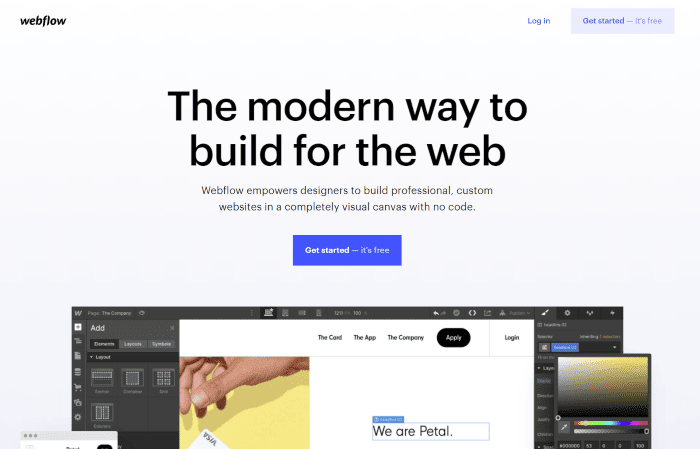
Webflow is loved by designers and web developers in particular. If you’re serious about website building and have experience at an expert level, you’ll love Webflow.
It is a visual, drag-and-drop website design tool that lacks the simplicity of other alternatives but is valued by advanced users who love the customization options.
Price
Webflow’s pricing structure is a bit complicated. They offer two types of plans:
- Site plans; prices below include 15% savings for an annual subscription
- Basic ($12USD/month)
- CMS ($16USD/month)
- Business ($36USD/month)
- Enterprise (Contact for pricing)
- eCommerce website plans; prices include 15% savings for an annual subscription
- Standard ($26USD/month)
- Plus ($74USD/month)
- Advanced ($212USD/month)
Pros
- Unrivaled flexibility for advanced users with coding skills for HTML, CSS, and JavaScript
- Includes front-end customization options for users without coding knowledge
- Allows more complex sites to integrate with a Content Management System and manage content like blog posts
- Handles hosting and maintains everything on a common infrastructure
Cons
- A more expensive option that is not worth the extra cost for many users
- A steep learning curve for casual learners
- Doesn’t offer as many templates, although what they have can be fully customized (if you know how)
- Doesn’t support eCommerce
4. Wix
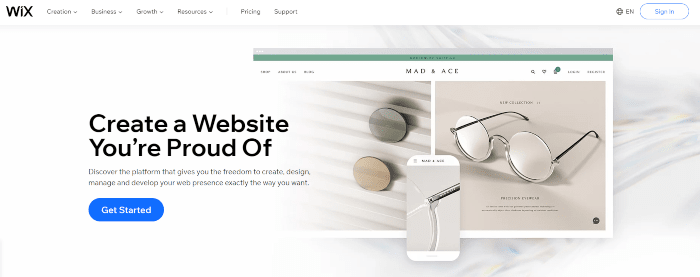
Wix is a great all-around website builder, and the most comparable to Squarespace.
Now, Wix is easy for new users to learn and, in our opinion, takes the edge over Squarespace in many ways.
But, two main drawbacks to Wix are that its website templates don’t have the same wow factor as Squarespace’s, and its blogging features are fairly basic.
Price
Wix offers a free plan and also has premium plans grouped into two plan types:
- Website plans
- Connect Domain ($5USD/month)
- Combo ($10USD/month)
- Unlimited ($14USD/month)
- VIP ($29USD/month)
- Business and eCommerce Plans
- Business Basic ($20USD/month)
- Business Unlimited ($25USD/month)
- Business VIP ($35USD/month)
Pros
- Offers an ad-supported free plan that includes hosting, over 500 templates, and unlimited pages
- Even with the free plan, you get access to Wix’s Artificial Design Intelligence. You can use the Wix editor if you want to retain total control over your web design
- Standard automatic backup
- The site is hosted by Wix on one of the fastest hosting platforms out there
- 24/7 customer support
- Includes third-party apps (~250)
Cons
- With the free plan, you’ll put up with ads on your site and a super long domain name
- The blogging format is more restrictive and includes basic functionality only
- Templates lack the variety and quality you get with a Squarespace website
- Squarespace’s dedicated mobile app takes the edge, although Wix is also mobile device responsive
- Unable to change the template after publishing
5. Weebly
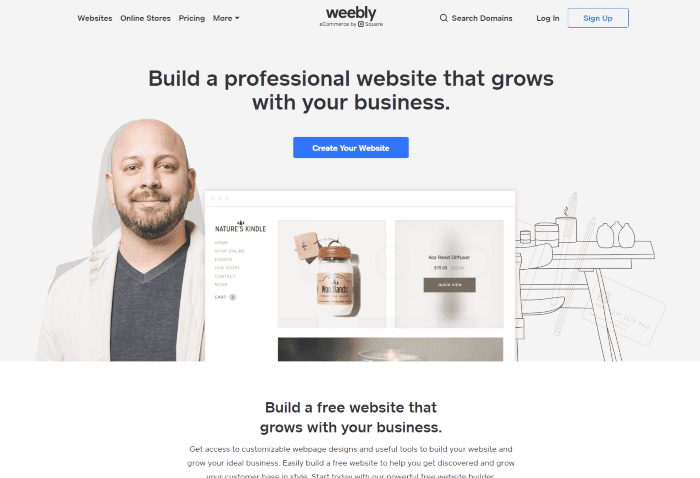
Weebly isn’t what it used to be. It’s better than it used to be!
After the digital payment processing company, Square, acquired Weebly in 2018, it’s become a solid web hosting service, especially for eCommerce sites.
Compared to Squarespace, Weebly is easier to use, making it a popular choice for small businesses and portfolio sites looking for a super-simple and foolproof website builder.
Price
Weebly offers a free plan and also has paid options that are billed annually:
- Website plans
- Personal ($7USD/month)
- Professional ($15USD/month)
- Performance ($30USD/month)
Pros
- Easy to use and beginner-friendly
- Can display HD video on the site, or as a background
- Offers a mobile app that lets you perform many tasks
- Includes decent blogging features
- Offers a free plan including features like an SSL certificate, unlimited bandwidth, and decent eCommerce functionality
- Includes third-party app marketplace with ~350 apps
- Caters to eCommerce
Cons
- With the free plan, you’ll put up with ads on your site and Weebly’s branding
- Difficult to add advanced marketing tools
- Templates are well designed, but selection is limited compared to Squarespace
- Doesn’t offer complete control over the placement of design elements
- Doesn’t allow users to restore their sites themselves
6. Site123
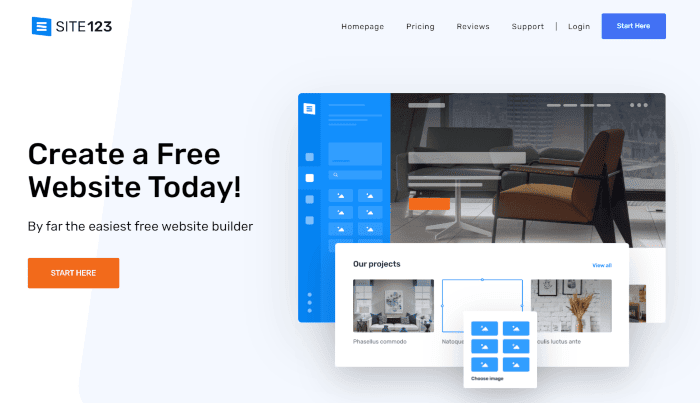
Site123 gets your website up and running in just 3 steps.
It’s a great fit for bloggers or small business owners who want a simple website and a no-hassle site building solution.
However, it’s not-so-great for anyone looking to build bigger, more complex websites, so plan accordingly!
Price
Site123 offers a free plan and also has a paid plan costing $12.80USD/month.
Pros
- Simple, easy to use, and gets your site published fast
- Offers a free plan
- The paid plan includes free domain for a year, 10GB of storage, and 5GB bandwidth, and offers eCommerce capabilities
- Includes twice as many templates as Squarespace, with 200 free options
- Fully mobile responsive
- Supports the creation of a multilingual site
- Great customer service, support, and chatbot assistance
Cons
- Site123’s free plan limits storage and bandwidth to 250MB, doesn’t include a custom domain or support eCommerce and requires you to have a floating Site123 tag
- Doesn’t have the power or the feature-rich creative freedom of other competitors; its simplicity is a double-edged sword
- Not suitable for large businesses or complex sites
7. Duda
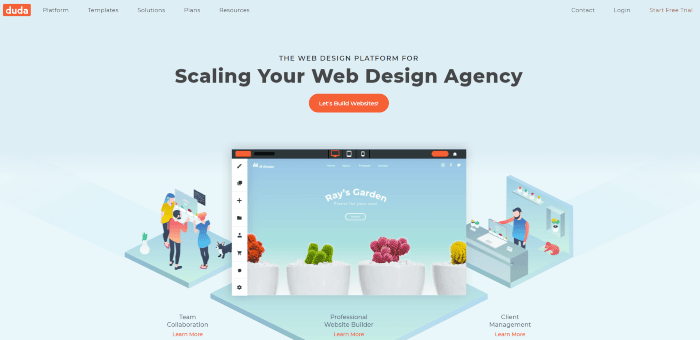
Duda has many similarities to Squarespace, including a strong site editor and pre-built templates. It stands out for its team collaboration and client management tools, and as an industry-leading mobile hosting platform.
It is particularly well suited for agencies needing an easily scalable business website.
Price
Duda offers a great 25% discount for annual billing but their prices are higher than many other Squarespace alternatives. The prices for the four plans below reflect the discount:
- Website plans
- Basic ($14USD/month)
- Team ($22USD/month)
- Agency ($44USD/month)
- Custom (Contact for pricing)
Pros
- Supports communication with other team members while using Duda’s website builder or while accessing HTML or CSS code
- Supports the creation of a multilingual site
- Offers backup and restore options
- Includes tools that support agencies in scaling, such as importing content from an existing site, reusing widgets on different projects, and sharing feedback directly on the site with team members and clients as the site is built
- Offers personalization options, like offers and discounts
Cons
- Pricing is expensive compared with the competition
- Doesn’t include a third-party app marketplace
- Lacks marketing features
- Can’t pick a different theme once your site is published
8. Zyro
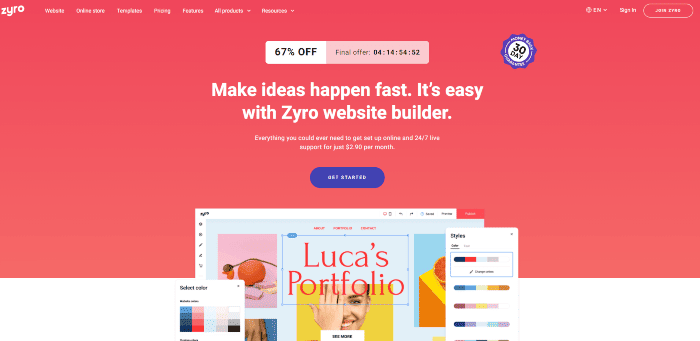
Zyro is an up-and-coming website builder that’s growing fast and showing tons of promise! With an affordable price tag and premium features, it’s giving Squarespace a run for its money.
Zyro allows users to create and use a free account for as long as needed. For new entrepreneurs starting out in website creation, this is a great and affordable choice for building their online presence.
Price
Zyro offers a free version and there are also four paid plans:
- Website plans
- Basic ($8.90USD/month)
- Unleashed ($10.90USD/month)
- eCommerce ($19.90USD/month)
- eCommerce Plus ($25.90USD/month)
When this post was written, Zyro had some awesome discounts of up to 67% off. As they try to establish a foothold in the market, you might get a great deal with Zyro!
Pros
- Ease of use compared to Squarespace, allowing users to publish a site in minutes
- Offers advanced AI with AI-backed features, like a logo maker
- Offers a free plan
- Includes pre-built templates for novice users, although the selection is limited to a couple dozen templates
- The basic plan includes 3GG bandwidth and 1GB storage, more than enough for a small business
Cons
- The free plan is ad-supported, doesn’t allow a custom domain or app integrations, and includes limited resources
- Some features, like template selection, are limited
- The process for transferring a domain is complex
- Overall, the builder is still working out some bugs
- Customer service and support are not yet dialed in
9. GoDaddy
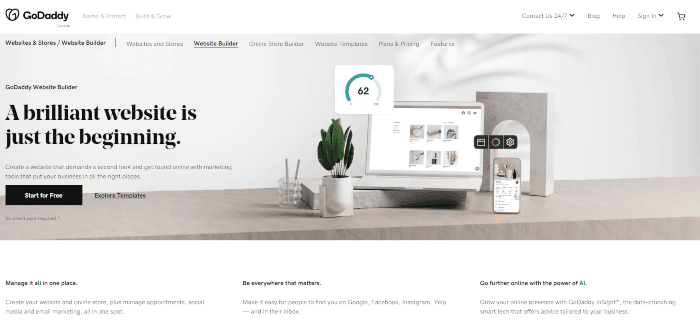
Almost everyone has heard of the hosting giant GoDaddy, but not everyone’s aware of their website builder, GoCentral. It has plenty of standard features, like an easy-to-use editor and pre-built templates.
It also has stand-out capabilities like access to marketing tools such as email marketing and social media integration.
Price
Like most other alternatives, GoDaddy offers better pricing for annual billing, which is reflected in the prices below. There is no free plan but four paid options:
- Basic ($9.99USD/month)
- Standard ($14.99USD/month)
- Premium ($19.99USD/month)
- eCommerce ($24.99USD/month)
Pros
- Includes 20 free templates and thousands of themes
- Stands out for vital marketing tools, like email marketing and social media integrations
- Offers an SEO wizard to help with ranking
- Known for great customer support
- Great fit for eCommerce sites or portfolios
- Allows you to switch themes anytime
Cons
- Limited customization of templates compared with competitors like Wix
- Doesn’t offer a free plan
- Doesn’t offer the same blogging support as other builders
- A mobile-friendly website, rather than an app, for editing on the go
10. Webnode
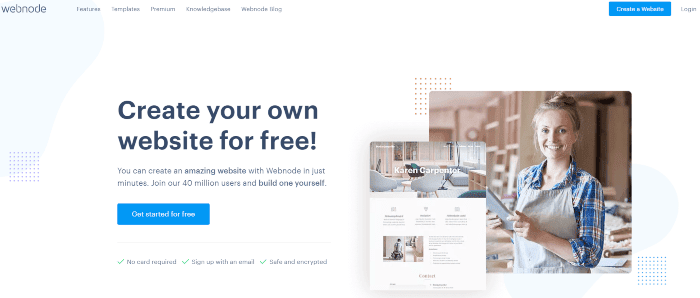
You’ve probably never heard of Webnode, right?
But this seemingly unknown site builder boasts over 40 million users worldwide.
With sleek, modern design templates, built-in web statistics, and a free image gallery, Webnode is a sturdy Squarespace alternative for smaller websites.
A quick run-through Webnode’s pricing tiers, and you’ll see a few deal breakers for certain people.
For example, all packages offer minimal storage space. And with the exception of their premium package, all other pricing plans come with low bandwidth allowances.
Still, for the right customer, Webnode is decently priced and offers a user-friendly web-building experience.
Price
Webnode offers a free plan that stands out as not being ad-supported. They also offer four premium plans, priced monthly:
- Limited ($3.99USD/month)
- Mini ($7.50USD/month)
- Standard ($12.90USD/month)
- Profi ($22.90USD/month)
Pros
- Includes a variety of pre-designed pages to get your site live in minutes
- Allows you to easily transfer your domain name or get a free one-year voucher with a premium plan
- Focused on affordability
- Supports multilingual sites
- Templates are professional and modern
- Unlike other builders, Webnode offers email accounts on most plans
- Offers a free plan that doesn’t bombard your site with ads
Cons
- Features for blogging are basic; for example, you can’t add comments or tags
- Lacks key features compared to competitors, like social media widgets, search bar, and a third-party app marketplace
- Limited functionality compared with other options
What’s The Best Squarespace Alternative?
Is Webflow better than Squarespace?
Who wins the battle of Squarespace vs Wix? What about Zyro vs Squarespace?
The answer’s up to you!
Ultimately, it comes down to your budget, what kind of website owner you are (hands-on or not), and what kind of site you’re launching.
WordPress is great for bloggers. Shopify is the clear eCommerce leader. For an agency, Duda is the best choice. Website designers or developers will get unrivaled customization options with Webflow.
So which Squarespace alternative will you try?
Time to get going!
The post The 10 Best Squarespace Alternatives to Build a Website [2022] appeared first on Smart Blogger.
from Smart Blogger https://ift.tt/33eOD1l
via IFTTT

No comments:
Post a Comment